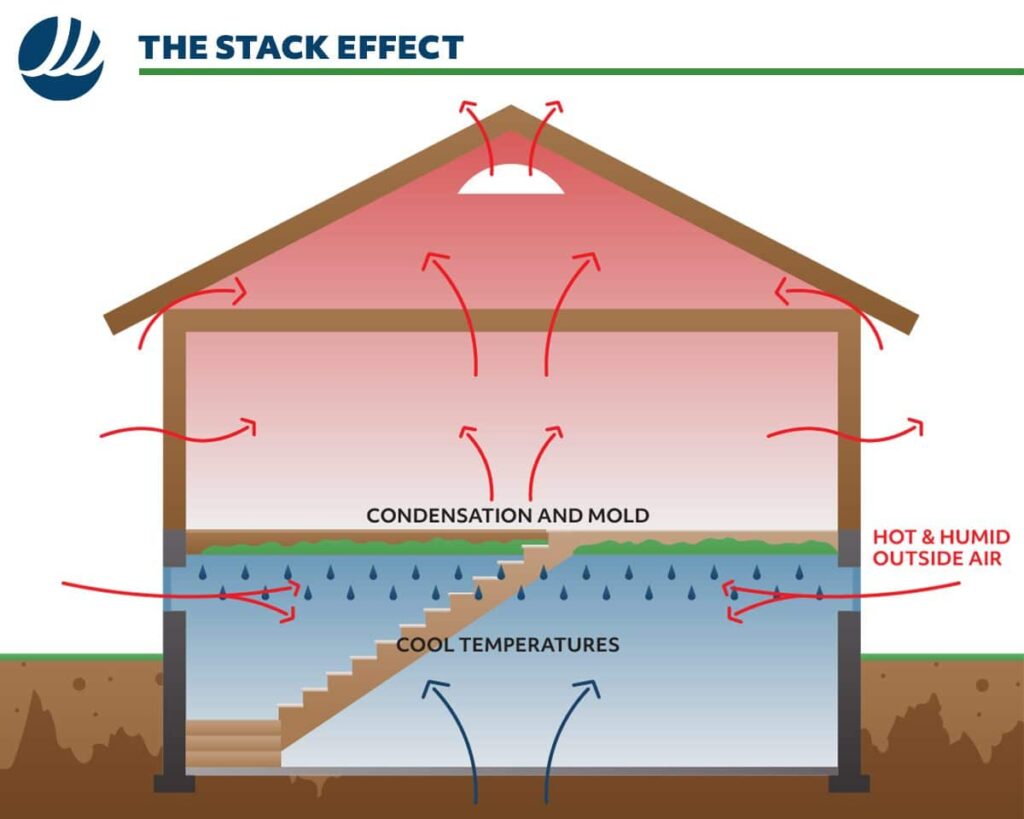
Are you wondering if a vapor barrier for concrete block walls is a good basement waterproofing solution? If so, stick around because we’re going to explain why a vapor barrier for concrete block walls is not the best way to waterproof a basement. There’s another waterproofing method that will make your basement dry enough to live in or use as storage for valuables.
How Do Basements Get Wet?
Most basements get wet because there’s too much moisture in the soil outside the foundation walls. The excess moisture causes hydrostatic pressure to build up in the soil and start pushing against the foundation wall. Hydrostatic pressure is powerful enough to push water through cracks in a concrete block foundation wall you didn’t even know were there. Hydrostatic pressure can even cause a concrete block foundation wall to bow inward and crack.
The excess moisture in the soil around the foundation can be caused by various things, including,
- Improper yard grading – Your yard should slope away from the house because you don’t want water draining toward the foundation and soaking into the soil around the foundation.
- Clogged gutters – When your gutters are clogged with leaves and other debris, water will spill over the side of your house and soak into the soil around the foundation.
- Downspouts that are too short – Short downspouts will release water too close to the foundation. Downspout extensions are inexpensive, easy to install, and will channel water away from the foundation before releasing it.
- Poor drainage around the foundation – Imagine you have the above problems and a poor drainage system. That’s a recipe for disaster. Hydrostatic pressure will build up in the soil and push water into your basement. The pressure could even cause structural damage to your foundation wall.
If you want a dry basement, you‘ll need to get groundwater around the foundation under control. Therefore, an effective waterproofing solution will do more than simply put up a barrier to keep water out. It will target the excess moisture in the soil.
Why You Don’t Want A Wet Basement
Wet basements are a breeding ground for mold. Now, if you’re not living in your basement, you might think, who cares? You should care because some of the air in your basement flows up and into your home’s living area via the stack effect (see below graphic). If the air is full of mold spores, residents of the house could develop allergies and respiratory problems.
A wet basement also means hydrostatic pressure has probably built up in the soil around the foundation and is already pushing against the foundation walls. If the wall isn’t already cracked or bowed, it could be just a matter of time. A cracked and bowed concrete block foundation wall is considered structural damage and must be repaired immediately.
What Is A Vapor Barrier?
A vapor barrier is essentially a piece of thick plastic polyethylene sheeting that keeps moisture from getting through your concrete block foundation wall and into the basement. Although some homeowners use vapor barriers in their basement, they are more commonly used to keep crawl spaces dry. For more information about how vapor barriers are used in crawl spaces, see Crawl Space Waterproofing: Why You Might Need It.
Is A Vapor Barrier for Concrete Block Walls The Best Basement Waterproofing Solution?
So, is a vapor barrier the best basement waterproofing solution? No, there’s a much better way to keep your basement dry. A vapor barrier doesn’t solve the root problem, which is excess water in the soil around the foundation. In the battle between water and a vapor barrier, water will always win.
If you want a basement dry enough to live in, you need to get groundwater under control. When there’s no excess moisture in the soil outside your foundation walls, there’s no moisture to get inside your basement. Pretty simple, no?
A Drain Tile System Is The Best Basement Waterproofing Solution
A drain tile system is the best waterproofing solution because it solves the root problem. It prevents excess moisture from building up in the soil around the foundation.
There are two types of drain tile systems, interior, and exterior. Although they’re easier to install when a home is under construction, both types of drain tile systems can be installed in existing homes. Here’s how they work:
Exterior Drain Tile System
After the soil around the foundation is excavated down to the footer, a shallow trench is dug around the outside perimeter of the foundation and lined with gravel. A perforated drainage pipe is placed into the trench and then covered with more gravel. The excavated dirt is then replaced. Excess moisture in the soil will now enter the drainage pipe and get directed to a sump pit. When the sump pit fills with water, a sump pump turns on and ejects the water away from the foundation.
Interior Drain Tile System
An interior drain tile system works similarly. However, it’s installed under the basement floor. For more information on how an interior drain tile system works, see Waterproofing With An Interior Basement Drainage System.
Signs You Might Need Basement Waterproofing
Some common signs you might need basement waterproofing include the following:
- Standing water – Even a small amount of standing water in your basement could be a sign you need basement waterproofing. Investigate where the water is coming from.
- Mold – A moldy basement is a sign of excess moisture. It’s coming from somewhere.
- Musty smell – The odor might be in the basement and the upstairs living area.
- Condensation – While this might be a sign you need waterproofing, this could also be caused by leaving windows open during the warmer months. The hot, humid air flows in and then condenses on cooler surfaces.
- Water running down a wall – Even a trickle of water should get your attention.
- Increased humidity
- There’s efflorescence on the walls – This white, chalky substance might be mistaken for mold. It’s actually salt, and it means there’s excess moisture in the concrete.
- There’s rust on items in the basement.
If you’re in our Kansas City, MO service area and are considering a vapor barrier for concrete block walls, we have a better solution that will make your basement dry enough to live in. Contact KC Waterproofing and Foundation Repair today for an inspection and estimate.











